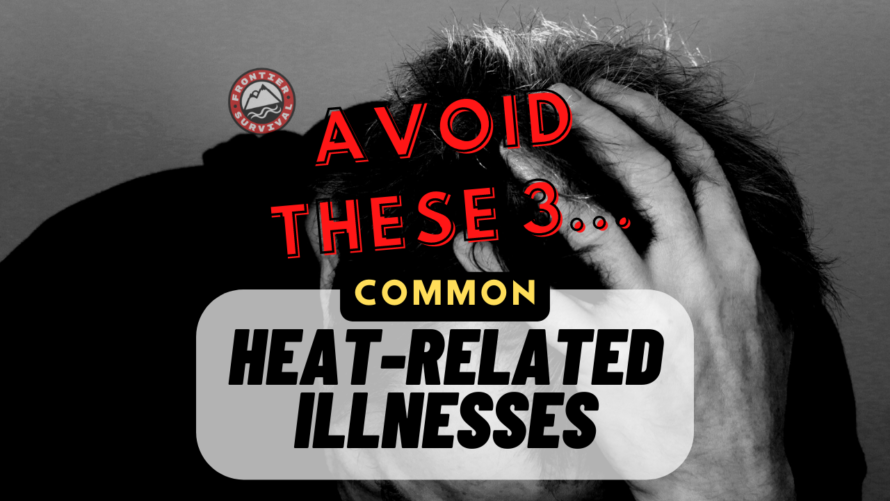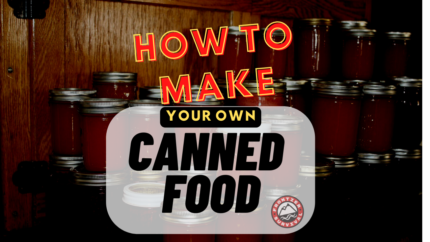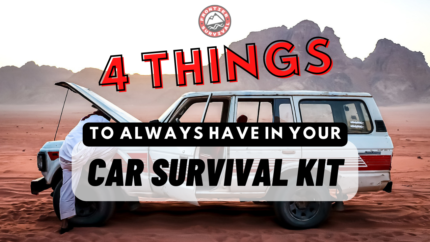You probably don’t associate the heat with getting ill, but heat related illnesses are a lot more common than you may realize.
In fact, depending on where you live, the chances of you suffering from one of the common heat related illnesses is a very real possibility during normal periods of hot weather.
And if you’re caught in a survival situation then the danger rises exponentially.
For instance, if the power goes out during a heat wave then you may find yourself stuck in a house that has no electricity for air-conditioning, fans, or even a fridge for cold drinks.
If it’s humid heat then your house will quickly turn into a sweltering sauna which could easily cause you to overheat, or suffer a number of other heat related illnesses.
If you’re forced to evacuate with your bug out bag and hike a few miles to the safe zone, the journey could cause you or a loved one to have debilitating cramps, or even pass out!
These are all very possible scenarios.
While nothing on this page is medical advice, we’re going to discuss 3 of the most common heat related illnesses.
We’ll also talk about how to avoid them, and how you can go about treating them if they happen.
Here are 3 of the Most Common Heat Related Illnesses & How to Avoid / Treat Them
Muscle Cramps
Muscles begin cramping when the body is lacking salt and water due to continuous perspiration.
It’s not the heat that causes the muscle cramps but the loss of salt and fluid from the body.
An old remedy for treating this problem is to dissolve a teaspoon of salt and sugar in a glass of water and drink it.
That’s basically what all those sports drinks are made of.
Those drinks are specifically formulated to help you re-hydrate by replacing the lost water, salt, and electrolytes in your body.
So treat your muscle cramps with your favorite sports beverage, or even just water with a little salt and sugar will help too.
Additionally, you can lightly massage the affected area to improve blood circulation and more quickly relieve the pain.
Fainting
Fainting can be very dangerous.
Seniors are particularly prone to fainting when they get dehydrated or overheat, but it can happen to people of any age.
The first thing you want to do when someone faints is to carefully check if they have any head injuries from the fall.
Make sure they are lying flat on the ground.
Heat related fainting can usually be remedied by helping blood circulate to the brain.
By lying them down in a flat position, the blood will go to their brain and regain consciousness.
Keep them lying down for at least 30 minutes before attempting to get up and move around again.
You may also want to give them one of those sports beverages we mentioned earlier to help them get re-hydrated, and give them an energy boost.
Heatstroke / Heat Exhaustion
Heat exhaustion happens when your body begins overheating.
Common initial symptoms of heat exhaustion are dizziness, confusion, nausea, weak but rapid pulse, and headache.
As soon you see someone experiencing the symptoms of heat exhaustion (or you start feeling these symptoms yourself) you need to immediately treat the problem
Otherwise it could escalate into heatstroke which is much more serious.
Heatstroke happens when your body temperature reaches 104 degrees Fahrenheit, or 40 degrees Celsius.
It can cause shock, brain damage, and organ failure in the victim if not treated immediately.
They may become short of breath, begin vomiting and develop a rash on their back, abdomen or chest.
You need to IMMEDIATELY cool the body.
Clothes should be removed, and the victim should be placed in a cool area away from direct sunlight.
Cover them with lots of cold water, and ice if possible.
The cold water will help to dissipate the heat in the body.
If you have ice packs then place them on the victim’s groin, under their armpits and on their neck.
You could also soak towels or bed sheets in ice water and drape them around the victim
In the event that you do not have electricity or access to ice, just pour water over them and fan them constantly.
The air blowing against their wet skin will help to cool their body down more rapidly.
Have them slowly take small sips of water.
It can take the victim more than a day to be fully re-hydrated.
Your best bet seek medical attention as soon as possible to avoid further complications.
The best way to treat these common heat related illnesses is to prevent them from happening in the first place!
Try to stay cool, hydrated, and pay attention to how you are feeling.
Dress appropriately; if the weather is hot then wear lightweight clothes.
Speak about this with family members and tell them to inform you if they are experiencing symptoms like feeling light-headed, dizziness, nausea, blurred vision, etc.
Always keep a close eye on children and seniors.
By recognizing the early symptoms you can take immediate action to mitigate the problem.
With enough warning, most heat related illnesses can be prevented.



